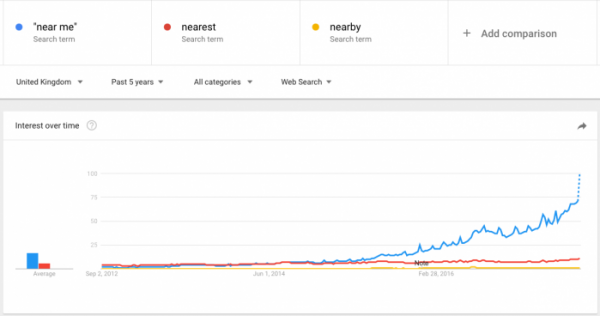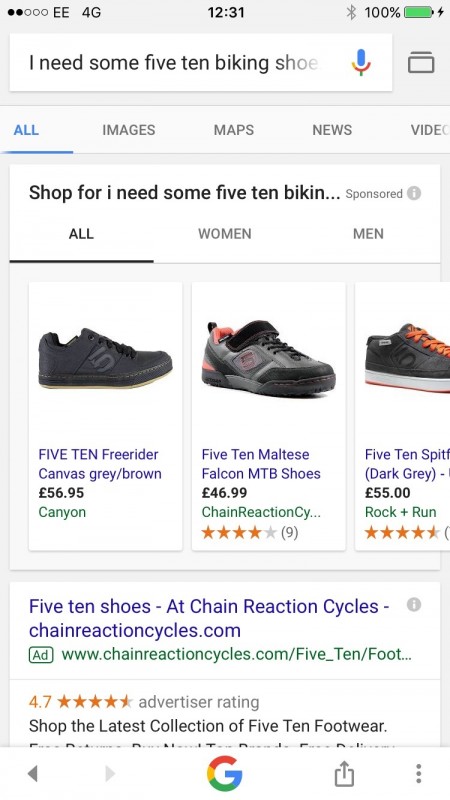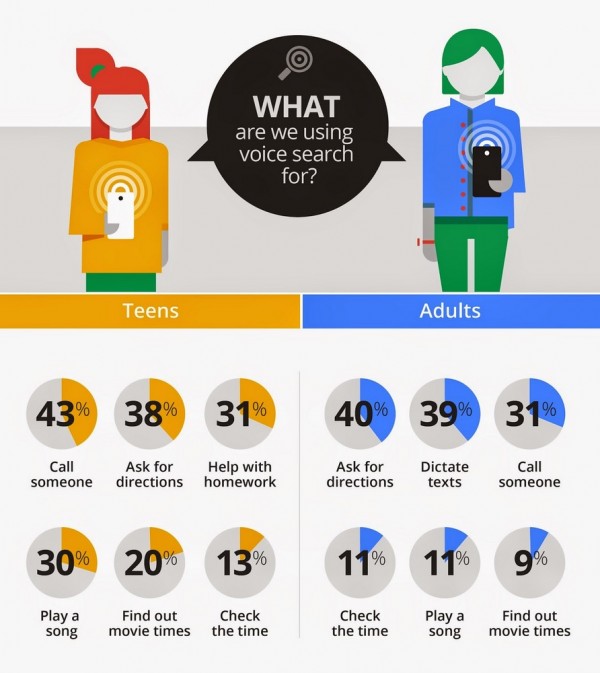OK, Google, how is voice search going to affect my PPC strategy? That’s a good question, and with the introduction of this new technology, we’re going to see some big changes in the way we behave both as consumers and advertisers.
Apple, Google, Amazon and Microsoft are all investing heavily in voice search and virtual assistants, with consumers speaking into their devices rather than typing in search queries. Google for example, have been at the forefront of search innovation for years, so this is likely the next step in its evolution not only as a mobile OS but also as a search engine.

Is Voice Search Even Relevant?
First of all, in order to evaluate if voice search is to have any impact on PPC, we’ll need to consider how popular it is. Consumers are currently using voice search both in the home and on the move. The former is made up of home-based systems such as Amazon Echo and Google’s hands-free smart speaker, and the latter is voice search built into smartphones such as Microsoft Cortana, Apple Siri and Google Assistant.
In the case of the home assistant, it’s difficult to see how this could be monetised with ads, as at present, upon performing a search, there is no way to display an ad because there is no screen. This may pose a problem to advertisers but also a problem to Google, as, after all, paid advertising is how they make money. With this in mind, Google is sure to have a plan on evolving this, as we’ve seen with many of their services, they begin life free and then are slowly monetised.
For now, this isn’t something we can consider in the PPC space. That leaves mobile, which is already an established medium that advertisers can target. Online searches via mobile surpassed searches made on computers some time ago, and in the online world, being mobile-friendly is now considered a necessity. On the AdWords platform, we can already target users by the device they are using and therefore run mobile-specific campaigns. So, when it comes to voice search, these assistants use the smartphone's default search engine and display results on the screen, in which case, this puts PPC very much in play.
How Popular is Voice Search?
Given that it’s only mobile, we can consider paid advertising (at the moment); from here on, we’ll focus on that only. So, in this case, it’s users searching online via voice search on smartphones.
According to Google, 20% of mobile queries are voice searches. In 2014, Google commissioned a study to reveal how, why and where people use voice search (OMG! Mobile voice survey reveals teens love to talk). Unsurprisingly, teens were ahead of the curve, with more than 50% using voice search daily, with adults not far behind at 41%.
However, it seems that most voice searches are used for directions, getting the time and performing actions on a mobile, e.g. Call John Smith or playing music etc. So in light of this, it's important that businesses understand what is being searched and are prepared to answer a question and solve a problem.
So What Does this mean for PPC Advertisers?
With more and more searches migrating to mobile and more of those mobile searches embracing voice search, there are important implications for content, SEO and PPC. The main one is the use of keywords, which may be easier to tackle with PPC than content marketing and SEO.
In terms of search queries themselves, these will become more conversational. There will be some obvious differences in how we search using a keypad vs our voice to search online. The main difference is that we’re likely to use longer phrases.
We aren’t going to say, “OK, Google, Weather, London” we’re going to say, “OK, Google, What’s the weather like in London today?” or “Hey, Siri, Where’s the nearest cafe?”. Knowing these main differences will affect your keyword strategy as voice search becomes more popular.
Here at ClickPilot, we already see the odd voice search query in some of our client search query reports, matched to phrase-match keywords, so we have been able to capture the search. You'll likely find a few if you check out your search query reports in Adwords.

These may not be that easy to spot at first, as in the example above, the user has mistakenly searched with “OK, Google”, which is the voice command to activate voice search, much like “Hey, Siri” on Apple devices. So it’s been included in the search making it easy to spot. In many cases, this won’t be included, and only the search that follows the voice command will be the search query.
Here are some things to look for when identifying voice searches;
Search Query Length: Voice search queries are typically longer than when typed in, perhaps four or more words.

Free Report
Spot Errors, See Strategies,
Our Free Report Reveals Key E-Commerce Fixes.
Book Your Call
Question Phrases: As already highlighted above, they are likely to be more conversational. E.g. “What’s the weather like in London Today?” Rather than “Weather, London”.
User Intent: Voice search is great at identifying user intent, which is great news for marketers, as question phrases can tell us what a user is thinking and what stage they may be in any buying journey. For example, What, Who, and How are modifiers that could perhaps indicate a searcher is at the research stage. When, Where and ‘Find Me..’ would be applied nearer the end of the buyer journey. “Where is my nearest Cafe?” This would indicate the user is ready for coffee and wants to find a venue nearby.
Local Value: Voice search can have high local value and is often used to find businesses and services nearby. Take a look at the trend developing in Google’s search trends, with the dotted line being Google's prediction.

Questions with buyer intent: The search query here may differ too, when searching for a product. For example, rather than “Organic Sun Lotion”, a search query may take the form of “Find me organic sun location” or perhaps “What’s the best organic sun location” with the consumer wanting their search engine to not only find the product they are looking for but also find the best for them without the need for their own research.

Getting Started With
Performance Max
Download Our Step-by-step guide to getting started with Performance Max Shopping Campaigns for your Shopify Store
GET YOUR FREE EBOOKFREE EBOOK
How To Optimise PPC for Voice Search
Regarding your PPC ads, there is no reason you can’t connect with consumers utilising voice search. In many cases, all the search assistant does is search on the device's default search engine and deliver the search result on the screen.
With this in mind, one of the best strategies for optimizing your PPC account for voice search is to make sure you include long-tail keywords in your keyword arsenal. This would be to match search queries that are much more conversational, mimicking the way we speak in everyday life.
1) Create your seed list
A good place to start is in your existing search data, which can be found in your search query report within your Adwords or Bing account. Currently, Search engines don’t provide any way of reporting on voice searches specifically, so it’s down to you to pick these out. As already mentioned, one way to do this is by identifying the length and the way the search is phrased. These are likely to be long-tail queries triggering your ads made up of 4-5 words or longer. Also, consider the intent of each of these longer search phrases. Can you tell if the searcher wanted to learn or buy?
2) Keyword Expansion
From data found in your search term report, you’ll have a seed list of search queries likely to be used with voice search, and you’ll know which of these work well and which don’t.
This is now your seed list to expand on, just like any keyword research. The Google keyword planner may be useful here but will involve a lot of manual filtering. A good place to get ideas for long tail keywords is Answer The Public, which draws data from Google and Bing to generate an aggregated view of questions related to your subject.

3) Sort by intent
Before diving into your AdWords or Bing account, you must sort your new key phrases by search intent. Just like when doing any keyword research, you will need to structure your campaigns and ad groups correctly, and very often, the query is likely to place a searcher by where in the buying funnel.
By thinking visually, you can serve ads in search results that meet user intent perfectly.

Here are some questions to ask yourself when considering keyword intent;
- Is the searcher asking a fact-based question or looking for background info?
- Are they looking for product varieties so further along in the buying journey?
- Are they approaching a purchase decision, performing product specific and/or comparison searches?
- Are they ready to buy?
Establishing where a consumer is in the buying journey will help you organise your campaign and optimise ad copy, landing page selection and bidding.
4) Landing pages
To maintain high campaign performance, you may need to tailor your ad copy and landing page copy to match these more specific long-tail queries. From your keyword research, you’ll have a good idea of which are the most valuable and, therefore, worth the most effort to optimise for.
Your landing pages will need a more conversational tone, answering questions and queries based on the keyword (or key phrases, let’s say) you are now targeting. You can therefore be more confident users will engage with your site, as it will better answer their questions and solve their problems.
5) Tackling 'low search volume'
For those of you seasoned PPC Advertisers, you’ll be all too familiar with the “low search volume” label for some keywords. This status is given to a keyword in your AdWords account that doesn’t attract enough searches on Google. The keyword will therefore remain inactive and won’t trigger your ad until search traffic for that keyword increases. Only then will it become active and start to trigger your ads.
This is quite frustrating as a PPC marketer, as you’ll often find long tail keywords that are relevant to your product marked as ‘low search volume’. Even pulling them out of your search query report and adding them to your keyword list will see some of them labelled like this. In the case of voice search keywords, you are more than likely to run into this problem, especially as voice search is still in the early stages of adoption.
So what are your options?
Leave the keyword as it is
When search queries pick up for this keyword, it will trigger your ads. In light that voice search is growing, one strategy is to leave them there, ready and waiting for when these relevant search queries do come into play.
Change match type
It’s common for long tail keywords that are set to exact or phrase match to be labelled as low search volume. This is due to the low probability of a user searching with 5-6 words in a certain order. One option it to open it up using broad match, which can attract all sorts of search queries and reduce relevancy. In this case, Broad Match Modifier is a good solution, as you can set some of the words in your search phrase to match, and phrase match would. For this, you add a “+” before the most important words in your search phrase.
It’s relatively simple and definitely possible to optimise your PPC campaigns for voice search. The infrastructure is already there, and you must figure out how to make the most of it. I know this is a lot to take in, but hopefully, this post has got you thinking about the potential voice search opportunities and how it may affect your PPC strategy.
It’s still early days for voice search, and we’ll likely see some evolution from Google in the coming months. One thing for sure is that it's not going anywhere, and it's likely to become more intelligent, accurate, and prominent. It can open up a fantastic new opportunity for your business, so why not run some tests and get ahead of the competition?
Good luck!

Book A Discovery Call
Looking for tailor-made PPC strategies? Our team is here to help you maximize your online store's potential. Book a discovery call with us for personalised insights and solutions.
Book Your Free ConsultationBook Your Call
